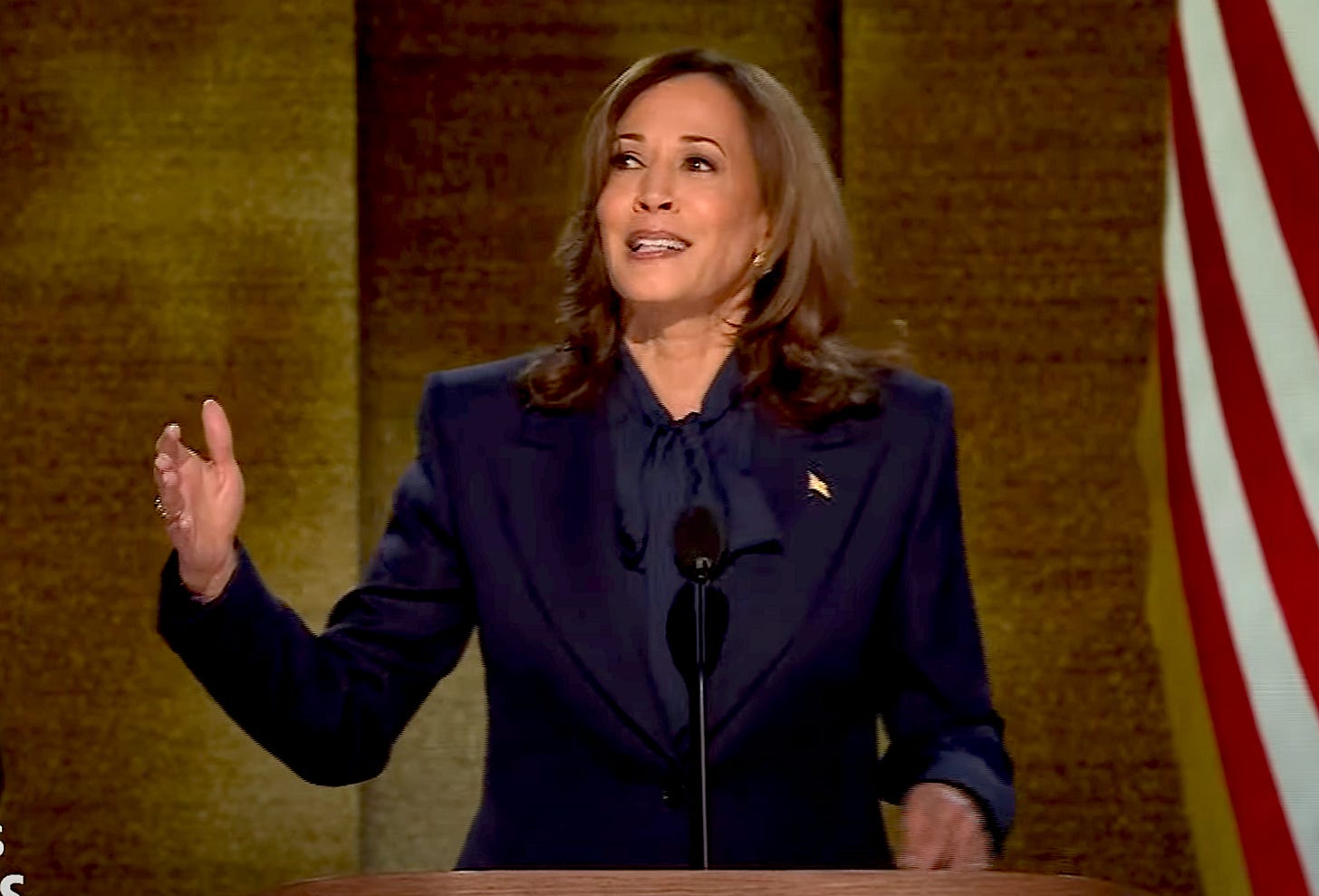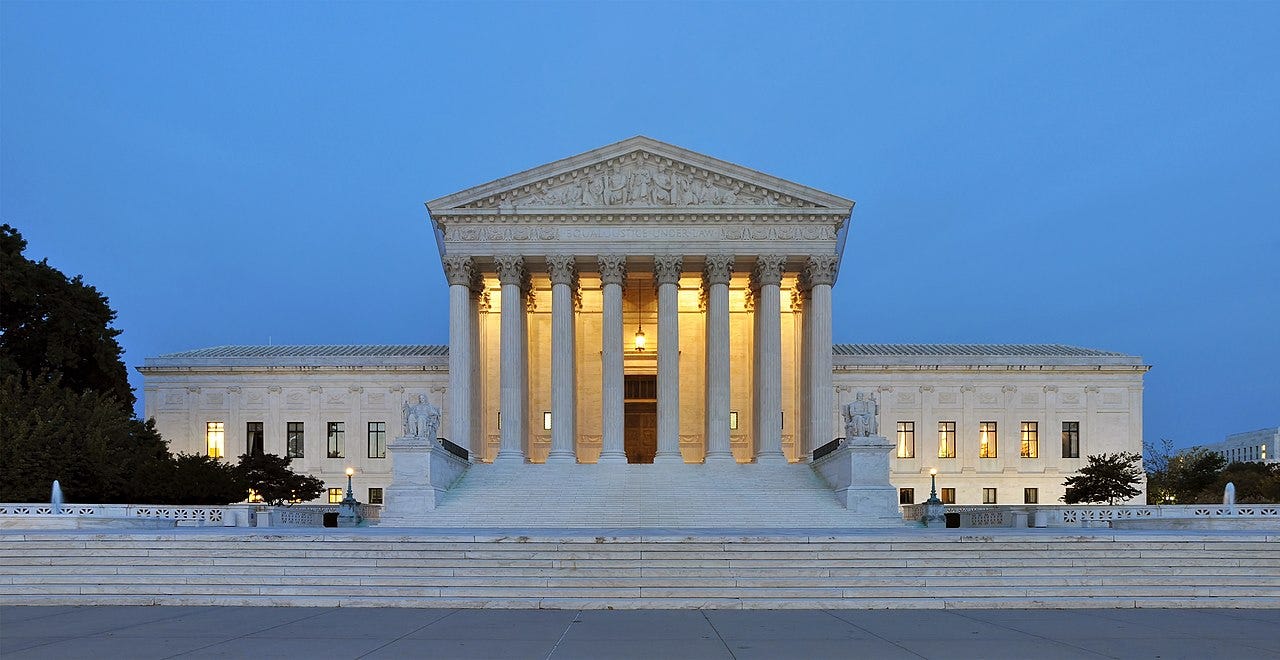
The Democratic Party just concluded its most successful convention in my lifetime. The contrast could not be greater. One party is newly energized and, even as it trotted out its list of greatest hits (Bill, Hillary, Barack, Michelle), talked more about the future and celebrated its new nominee. The other party seems mired in a ditch with a bitter old man who is incapable of adjusting to change and continues his pattern of race-baiting and scaremongering. All issues aside, whom would you vote for based on optics alone?
Even the vice presidential nominees provide a study in contrasts: In his acceptance speech, Democrat Tim Walz exuded his trademark down-home folksiness, cultivated by decades as a high school social studies teacher and National Guardsman, while J.D. Vance pursued his role as an attack dog and clumsy Trump surrogate. In case you missed it (ICYMI), you can catch Harris’ entire acceptance speech here. It was better than I expected and, at only half an hour, it’s really worth a watch.
By the way, if we ever needed more evidence of how out of his element Vance is, look no further than the video below in which he labors to make small talk with lukewarm employees at a Georgia doughnut shop, including a Black woman who doesn’t even want to be on camera with him:
It was great to see Democrats seize the mantle of patriotism from Republicans who think they own the concept. From the hundreds of hand-held American flags to the frequent invocation by the featured speakers of what a great country we have, Democrats made clear that conservatives do not have a monopoly on love of country.
Too often in the past, progressives have seemed uncomfortable with ostentatious displays of patriotism, often dismissing people who do so as “flag-wavers.” They allowed the right to effectively seize the flag as their own symbol. If you heard delegates at a Democratic convention in the 1980s chanting “USA, USA!”, you’d have thought your ears were deceiving you. No more.
As never-Trump Republican Charlie Sykes wrote recently:
Close your eyes for a moment, and it feels like the sort of thing that you would have seen and heard at a Republican Convention in The Before Times. But this time around, the contrast with the GOP convention is searing, and for this center-right political orphan, deeply welcome.
See former Fox News host Eric Bolling fret about it below:
In her optimism, Harris evoked images of — dare I say it — Ronald Reagan. It’s obvious that Republicans need a new leader, but establishment types in the party are too afraid of Trump’s followers to do anything about it. So here we are.
Somehow I don’t think the Vance video above will make it into a Trump campaign commercial. The man who grew up poor in Kentucky and Ohio, wrote a book about it, and is now Trump’s hapless running mate, has strayed so far from his roots by becoming a Silicon Valley insider that he doesn’t even know how to banter with food-service working stiffs. But I digress …

Now that both parties’ national infomercials have concluded, we can focus more on the issues. Last week, we addressed the subject of Democratic nominee Kamala Harris’ recently released set of policy proposals and priorities she’d like to pursue in a first term. See below for a reminder:
Notably missing from the list was whether she embraced President Biden’s last-minute proposal, issued after he had withdrawn from the race last month, to reform the Supreme Court, which, as regular readers of this column know, has been a pet peeve of mine for some time:
But it turns out that Harris had previously signaled her support of Biden’s ideas on reforming the high court. And I think it’s safe to say that the fate of Biden’s proposal lies in her hands. His plan of action addresses both the actions the court has taken and the operations of the court itself. In a nutshell here they are:
A constitutional amendment reversing the high court’s recent ruling granting the president — in that particular case, Donald Trump — immunity for crimes he might have committed in his official capacity as chief executive.
Term limits, reportedly 18 years, for Supreme Court justices.
An enforceable code of ethics.
Biden did not make the case for expanding the court — he had thrown cold water on the idea before — so we will set that aside for the moment.
They all sound reasonable but, as they say, the devil is in the details. The first is the most problematic. Should a president be shielded from prosecution for illegal acts he might have committed while in the performance of his official duties? The obvious answer seems to be no because in a free society and a functioning democracy, no one is above the law.
But as is often the case in these matters, it’s not so simple. Imagine for a moment that you are president. In retaliation for a terrorist attack, you launched a drone strike in Afghanistan that killed dozens of people, including some U.S. nationals who happened to be in the region. Don’t shake your head. This actually happened.
As former Attorney General Eric Holder admitted to Congress, at least four Americans were killed between 2009 and 2013 by drone attacks ordered by then-President Obama. Should the Justice Department of Donald Trump have been able to prosecute Obama for four counts of second-degree murder? Of course not. So there needs to be some form of qualified immunity for presidents acting in their official capacity. The question is where the line should be drawn. The boundary would likely be decided by the courts (again).
As for a code of ethics, I’m all for it. As I wrote last year during the height of the Clarence Thomas scandals, unlike other courts (and other branches of government), the SCOTUS has no ethics code. In its place, there are some flaccid reporting requirements that both Thomas and other members of the court have ignored without consequence, as ProPublica has reported. I have heard no compelling arguments against holding the SCOTUS to the same ethical standards other federal judges must adhere to.
As for term limits, I support them in principal. There is no compelling reason to give lifetime tenure to any judge, even those who sit on the highest court in the nation. Instead of limiting SCOTUS justices to single 18-year terms, I would institute a mandatory retirement age.
Most states maintain mandatory retirement ages for at least some of their judges. In my home state of Connecticut, judges must retire at 70. In my adopted home state of Texas, most judges must retire at 75. Last November, voters quite sensibly rejected a constitutional amendment that would have raised the mandatory retirement age to 79.
Of course, that does raise the possibility that a mandatory retirement age could start an “arms war” in which succeeding presidents nominate potential SCOTUS justices and federal judges who are younger and younger. But it seems they are doing that already in the federal courts.
This just in via the Wall Street Journal (free link):
Robert F. Kennedy Jr. Drops Out of Presidential Race, Endorses Trump
It could make a difference in a swing state or two. It does have the effect of raining on the Dems parade, no?








Good sensible writing and viewpoints, Terry.